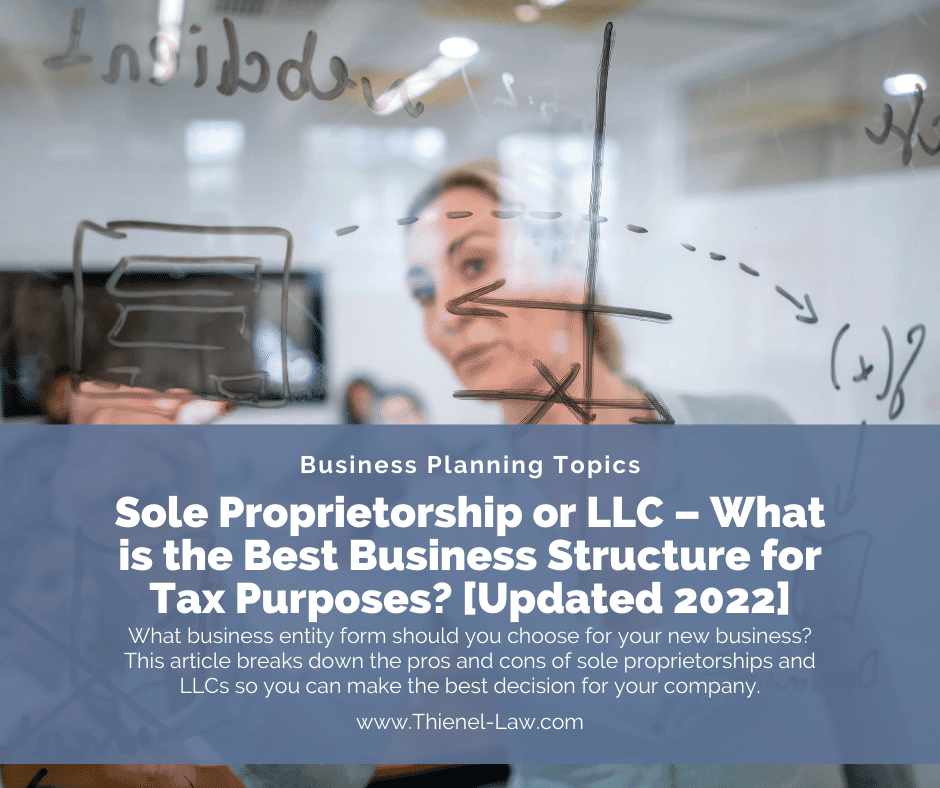Sole Proprietorship or LLC – What is the Best Business Structure for Tax Purposes? [Updated 2022]
Should you choose a sole proprietorship or an LLC for your business? For most businesses out there, I recommend an LLC. Read on to learn more.
The Most Common Business Structure Question…LLC or Sole Prop?
For anyone looking to start a business, one of the first steps involves choosing the business entity form. Popular options include sole proprietorships, limited liability companies (LLC), and corporations. Each entity type has different benefits and drawbacks, and there is no one “correct” choice. The best option is dependent on the business owner’s plans and appetite for risk and liability.
Choosing the wrong entity can cost you time, money, and potential opportunities, so it is best to seek the advice of an experienced business transactions attorney before making a final decision between a sole proprietorship or LLC.
Sole Proprietorship or LLC?
Sole Proprietorship
A sole proprietorship (“sole prop”) is formed by default anytime a person is engaging in business with the purpose of making a profit. For that reason, this business entity is also the easiest to form – it involves no registration with the state or federal government at all. If you are operating a business for profit and have not organized or incorporated in any state, then you are by default a sole prop..
Unfortunately, this simplicity has a few drawbacks. Most notably, sole props leave the business owners personally liable for all debts and judgments against their business. To avoid this unnecessary source of legal liability, it is best to speak to a business lawyer about the best way to organize or incorporate under your state’s laws. They may be able to provide options for liability protections.
A sole prop will use “pass-through” taxation. This means that all profits derived from the business will be taxed to the individual owner according to the seven tax brackets that apply to personal income, ranging from 10 percent to 37 percent – compared to the single corporate tax rate of 21 percent that is levied on corporations.
Importantly, in addition to the business not having to file income tax returns and pay a business income tax, most pass-through taxpayers will be able to deduct from their total income up to 20 percent of the profits from a sole proprietorship utilizing “pass-through” taxation.
Limited Liability Company
A limited liability company is generally a more formalized version of a sole prop if there is only a single owner. Unlike a sole prop, a limited liability company must register with the state. In addition to registering with the state, an LLC has several other obligations, though the exact requirements vary depending on the state of organization.
In general, an LLC must file certain documents and tax filings (including estimated taxes) regularly with the state and federal governments. In addition, the business must draft “Articles of Organization” which detail the ownership structure, profits, and other basic necessities of a business.
Thankfully, the extra requirements that come with an LLC also come with several benefits. The most notable, and the biggest difference from a sole proprietorship is the limitation of personal liability.
Unlike a sole prop, where the individual running the business is personally liable for all debts incurred by the business, the owner and owners of a limited liability company are not personally liable. This means that, in the event of a business failure, owners running their business through a limited liability company will be able to wind down the business, without personally being liable for business debts and judgments.
A sole owner would be required to declare personal bankruptcy in order to avoid these business obligations.
Similar to sole proprietorship taxes, an LLC defaults to “pass-through” taxation. This means that a limited liability company, unless it elects otherwise, will ultimately apply the personal income tax rates against a percentage (varying from 80 to 100%) of the profits derived from his or her business operations.
If the LLC has a single owner (“member”), the LLC member would report his income in the same manner as a sole proprietor—using Form 1040, Schedule C. If the LLC has more than one member, the LLC reports its income using a partnership tax return (Form 1065) unless the LLC elects to be taxed as a corporation in which case it would report its income using Form 1120 or Form 1120S.
“A sole prop is the simplest and most flexible corporate form – but the personal liability that attaches to all business operations can potentially create a host of problems later down the road. ”
— Steve Thienel
LLC vs Sole Props - The Take-Away
The decision to form a sole proprietorship business or LLC is a personal one that should be made with an understanding of risks and benefits. A sole prop is the simplest and most flexible corporate form – but the personal liability that attaches to all business operations can potentially create a host of problems later down the road.
A limited liability company, on the other hand, limits the liability of the business owner. However, the limitation of personal liability comes with the more formalized requirements of state LLC laws – typically, annual fees, registration requirements, and special instructions for filing taxes.
Both sole props and LLCs utilize “pass-through” taxation. This means that, unlike most corporations, which are taxed at a 21 percent tax rate (and then the profits are taxed a second time to the shareholder upon receipt of corporate dividends), the pass-through business will be taxed only at the personal level using only personal income tax rates. For most businesses, this personal tax rate will only be applied to 80 percent of the income derived from the business, per the new tax reform bill.
If you have questions about business formation issues, schedule a consult with business transaction attorney Stephen Thienel today. Mr. Thienel has decades of experience assisting clients with their business transactions throughout, Maryland, Virginia, and the District of Columbia.
Related



![[VIDEO] Start-Ups 201 - Holding Companies - Why You Might Want One](https://images.squarespace-cdn.com/content/v1/639b5b2c4098ba4df6e6dc92/1673034629653-0YX931G3EEQJ4ZZNV30K/Video%2BScreenshot+%281%29.png)
